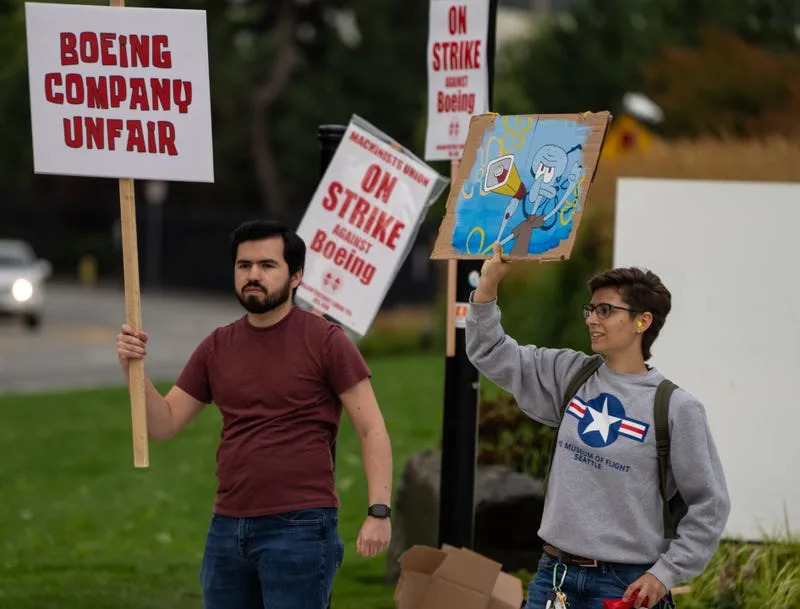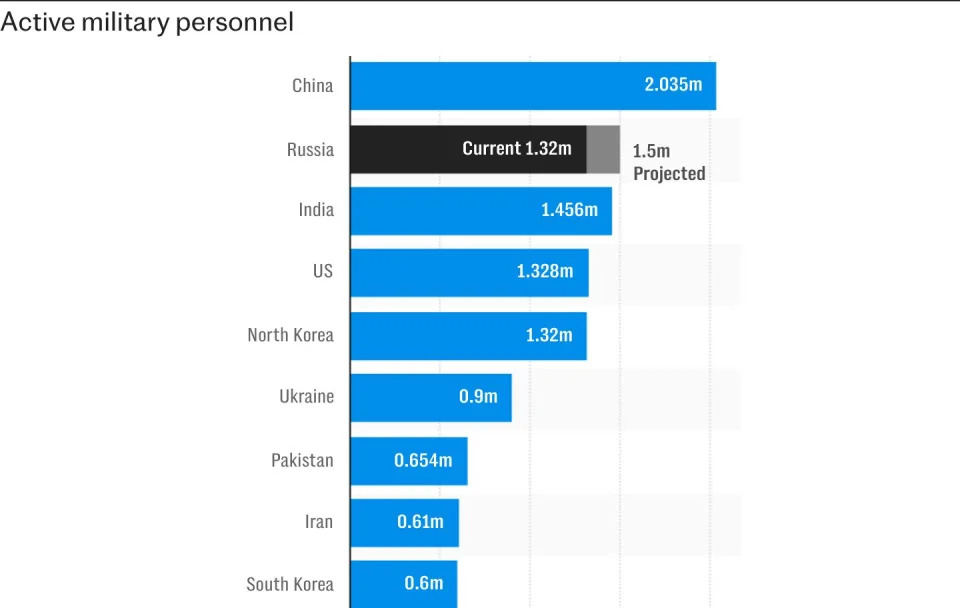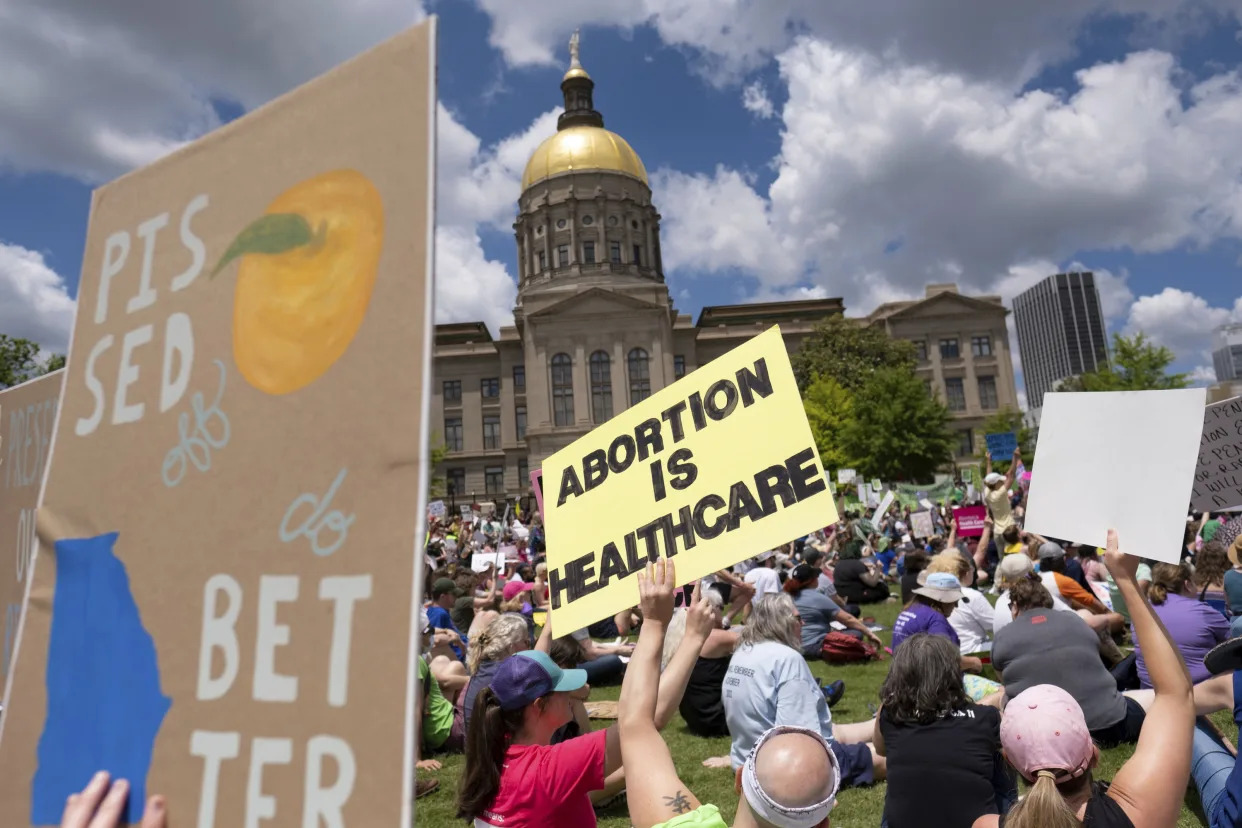Boeing pulls “final offer” from negotiations
KIRO 7 News Staff
Wed, October 9, 2024
There were major breakdowns in the Boeing negotiations tonight as both the company and the union claimed the other is refusing to compromise.
Boeing says their “final offer” has officially been withdrawn.
That move came today after negotiations stalled, despite the union previously saying they would refuse to vote on it.
The company and union leaders spent the last two days in talks and tonight, after neither side budged, Boeing said “Further negotiations do not make sense at this point” and yanked the deal off the table, four weeks into the strike.
Boeing added in their statement, “We remain committed to finding a resolution and will work with the union when they are ready to bargain an agreement that recognizes our employees and preserves our company’s future.”
Meanwhile the term of the night for the union - holding the line.
They also released a statement, saying in part, “‘One day longer, One day stronger’ is more than just a catchphrase. It’s our battle cry that we must all use as we stand together, united and defiant against one of the most powerful companies in the world.”
Updated Wed, October 9, 2024
By Shivani Tanna and David Shepardson
(Reuters) - Talks between Boeing and its key manufacturing union broke down, and no negotiations are currently planned as the financially damaging strike heads into a fourth week.
The company said on Tuesday it withdrew its pay offer to around 33,000 U.S. factory workers, saying the union had not considered its proposals seriously after two days of talks.
The stalemate shows no signs of resolution, a person briefed on the talks said. S&P analysts estimate the strike will cost Boeing about $1 billion a month.
"Unfortunately, the union did not seriously consider our proposals," Boeing Commercial Airplanes head Stephanie Pope said in a note to the employees, calling the union's demands "non-negotiable".
"Further negotiations do not make sense at this point," she said.
The breakdown compounds financial and production problems at Boeing, one of the two primary global commercial aircraft makers. The company has been burning cash in 2024 as it struggles to recover from a January mid-air panel blowout on a new plane that exposed weak safety protocols and spurred U.S. regulators to curb its production.
Earlier this year, Boeing replaced its CEO Dave Calhoun with Kelly Ortberg, who started in August with the hope to pull together a labor deal and shore up the company's reputation with customers and regulators. So far, none of that has happened.
Boeing is now examining options to raise billions of dollars to shore up its balance sheet. Reuters reported that it was looking to sell stock and equity-like securities, with its prized investment grade credit rating at risk.
The company has also introduced temporary furloughs for thousands of salaried employees, while the factories producing its best-selling 737 MAX and its 767 and 777 planes are shut. The company's goal to boost output of its 737 MAX planes to 38 a month will likely not come to fruition until mid-2025, S&P said.
Shares of the U.S. planemaker were down 1.7% in premarket trading on Wednesday. The stock has lost more than 40% of its value in 2024, with a 5% fall since the strike began on Sept. 13.
Referring to the two days of negotiations, Pope said, "Our team bargained in good faith and made new and improved proposals to try to reach a compromise, including increases in take-home pay and retirement."
The International Association of Machinists and Aerospace Workers union pushed back on those assertions, saying that Boeing was "hell-bent on standing on the non-negotiated offer" proposed last month.
"They refused to propose any wage increases, vacation/sick leave accrual, progression, ratification bonus, or the 401k Match/SCRC Contribution. They also would not reinstate the defined benefit pension," it said.
The union, which represents factory workers on the west coast, wants a 40% pay rise over four years and the restoration of a defined-benefit pension that was taken away in the contract a decade ago. More than 90% of workers voted down an offer of a 25% pay rise over four years before going on strike.
Boeing made an improved offer last month that it described as its "best and final", which would give workers a 30% raise and restore a performance bonus, but the union said a survey of its members found that was not enough.
(Reporting by Shivani Tanna in Bengaluru, David Shephardson in Washington and Joe Brock in Los Angeles; Editing by Christian Schmollinger, Jamie Freed and Arun Koyyur)
Boeing says negotiations with its union 'do not make sense' as strike drags on
William Gavin
Wed, October 9, 2024 at 6:40 AM MDT·2 min read

Some 33,000 Boeing machinists have been on strike since September 13, or 26 days. - Photo: Stephen Brashear (Getty Images)
Boeing (BA) on Tuesday withdrew its latest offer to union machinists after negotiations broke down as their strike heads into its fourth week.
The Arlington, Virginia-based firm’s offer — which it had labeled its “best and final proposal — had included 30% pay raises for the 33,000 factory workers who have been on the picket line since Sept. 13 after they rejected a tentative labor deal.
District 751 of the International Association of Machinists and Aerospace Workers (IAM), which represents those workers, has slammed Boeing’s offer as disrespectful. The union has argued that its workers need a 40% wage hike to combat the cost of living, a return to the pension system it gave up in a 2014 deal, more input into product safety, and other benefits.
“Unfortunately, the union did not seriously consider our proposals,” Boeing Commercial Airplanes head Stephanie Pope said in a note to the employees on Tuesday, according to Reuters. “Further negotiations do not make sense at this point,” Pope added as the executive called the IAM’s demands “non-negotiable.”
As the strike continues, its economic impact grows larger. There’s already some worry that it will throw off the November jobs report. In addition to the more than 30,000 workers who walked off the job, Boeing has initiated furloughs. Boeing’s issues — which began this year with an almost catastrophic incident involving a 737 Max 9 jet and has led to intense scrutiny of its operations — may also have repercussions for Boeing suppliers.
“The recent hurricane in Florida and the Carolinas and the Boeing strike have the potential to weigh on GDP growth for the remainder of the year,” Oxford Economics analysts wrote in a recent note.
S&P Global Mobility (SPGI) on Tuesday estimated that Boeing will incur a cash outflow of roughly $10 billion in 2024, partially due to the strike and measures taken to overhaul its manufacturing process, and issued a negative outlook for the company’s credit ratings. Boeing is expected to burn about $50 million a day in cash because of the strike.
Boeing is looking at options to raise billions of dollars, Reuters (TRI) reported, including selling stock and equity-like securities.
Boeing's negotiations with union leaders break down 2 days after restarting
Pete Syme
Wed, October 9, 2024

Boeing's negotiations with union leaders break down 2 days after restarting
Boeing and union leaders resumed negotiations on Monday but reached a stalemate by the end of Tuesday.
IAM District 751 said Boeing was "hell-bent" on its second offer, which had now been withdrawn.
A Bank of America analyst estimated the strike was costing Boeing $50 million a day.
Talks between Boeing and union leaders have broken down two days after restarting.
Some 33,000 members of the International Association of Machinists and Aerospace Workers have been on strike since September 13.
The first offer of a 25% pay rise was overwhelmingly rejected, while the union criticized Boeing for sending its second offer to the media and not negotiating with union leaders.
"The company was hell-bent on standing on the non-negotiated offer," the union negotiating committee for IAM District 751 said on Tuesday.
Boeing withdrew its offer after negotiations collapsed, the CEO of its commercial airplanes divison, Stephanie Pope, said in a message to employees.
"The union made non-negotiable demands far in excess of what can be accepted if we are to remain competitive as a business," she said.
Boeing had offered a 30% pay rise, a contract signing bonus of $6,000, and a commitment to building the next airplane in the Seattle area if that begins in the next four years.
Pope said that Boeing proposed increases in take-home pay and retirement, but accused the union of not "seriously" considering this.
However, IAM District 751 said Boeing "refused to propose any wage increases, vacation/sick leave accrual, progression, ratification bonus, or the 401(k) Match/SCRC Contribution."
It has called for a 40% pay rise over four years and the reinstatement of the traditional benefit pension plan, which was replaced with a 401(k) in 2014 negotiations.
Boeing could be losing about $50 million a day due to the strike, according to an estimate from Ron Epstein, a Bank of America analyst.
"The strike in the Pacific Northwest has deeply affected our business, our customers, and our communities," Pope told employees Tuesday.
"We understand that the steps we're taking to preserve cash affect you and your loved ones. We do not take these impacts lightly as we take actions and consider next steps."
Jon Ostrower, editor in chief of The Air Current, said on X post that for Boeing, "next steps" has historically referred to layoffs.
Boeing is trying to save money during the strike by barring executives from flying business class and asking some staff to take one week of furlough every month.
Asked for comment on talks breaking down, a Boeing spokesperson referred to Pope's message to employees.
"We remain committed to finding a resolution and will work with the union when they are ready to bargain an agreement that recognizes our employees and preserves our company's future," Pope said.
The IAM District 751 negotiating committee also said it "remains ready to continue mediated or direct talks."
The negotiation stalemate marks another challenge for the embattled planemaker and its CEO, Kelly Ortberg, who took two months ago.
He has also had to contend with supply-chain constraints, certification delays, and the fallout from January's Alaska Airlines blowout.
S&P Global Ratings may also downgrade Boeing's bonds to "junk" status because of the











